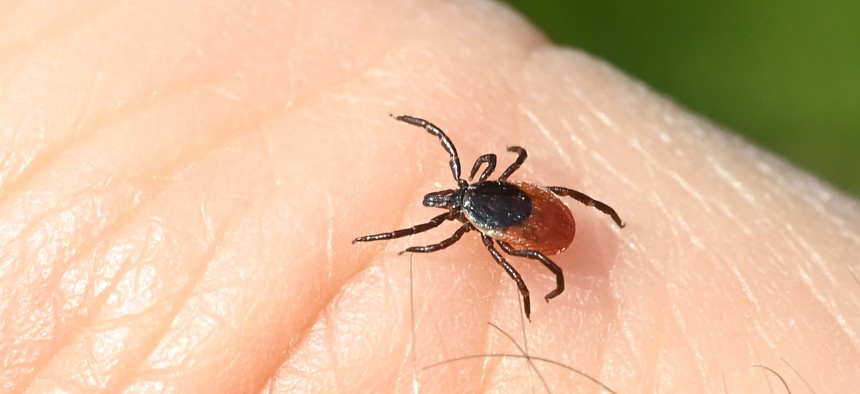Connecting state and local government leaders
State and local governments are on the front lines of combatting a growing public health threat posed by the blood-sucking bugs.
With tick-borne diseases rising across the nation, cities and states are stepping up efforts to strengthen reporting requirements and educate the public about the risks posed by the tiny arachnid.
Elected officials at every level of government are launching or expanding programs to address the growing threat. In 2019, Congress passed the Kay Hagan Tick Act, named for the former U.S. Senator from North Carolina who died of complications of Powassan virus, which she contracted from a tick.
The measure requires the U.S. Department of Health and Human Services to develop a national strategy to address vector-borne diseases, including tick-borne illnesses. It allocates $20 million per year from 2021 and 2025 to help states build prevention and education programs and improve data collection.
Some states and municipalities are just beginning that process. Others, such as Pike County in northeastern Pennsylvania, have well-established initiatives to address the threat. The county established a task force on tick-borne diseases in 2015 after a group of advocates who were suffering from tick-related illnesses pressed for it.
Made up of medical professionals, state legislators, county officials, educators, public health experts and scientists from East Stroudsburg University, the task force has launched a number of initiatives, said Brian Snyder, a Pike County community planner and vice chair of the panel.
Education is a key part of the effort. “The task force has created several brochures and handouts with different information on how to protect yourself from ticks and [tick-borne diseases],” Snyder said in an email. “The task force conducted a tick study to see the prevalence of [tick-borne illnesses] in the county.’’
The panel also is working with school districts to develop a protocol to be used by school nurses when a student comes into their office with a tick on their body.
And it has pushed for legislation to address tick-borne illnesses, but, Snyder said, “that is a slow process.” Lawmakers in Pennsylvania are considering two bills related to Lyme disease: One would require medical examiners to report the death of anyone infected with Lyme or another tick-borne disease to health authorities and the other would mandate that insurance companies to cover the costs of testing for tick-borne illnesses and instituted new reporting rules.
Education and Outreach are Key
At the Midwest Center for Excellence for Vector-Borne Diseases at the University of Wisconsin-Madison, the focus is on research as well as training public health entomologists and educating the general population about the illnesses transmitted by ticks and mosquitos.
“Education and outreach are definitely a big piece of it,’’ said Xia Lee, a vector biologist at the center who is researching the management of ticks in recreational parks and residential properties. The state has launched a social media campaign, dubbed "Fight the Bite,'' that aims to alert the public about the dangers ticks can present.
In 2020, the Wisconsin legislature approved a bill, signed into law by Gov. Tony Evers, that establishes signs at state parks where Lyme disease is prevalent. Researchers continue to press for other efforts, including funding for Lyme Disease Epidemiologist within the state Department of Health Services and the establishment of a tick-borne disease study committee.
Education is also a cornerstone of Virginia’s approach. The legislature approved a measure this year that requires the commonwealth’s Department of Conservation and Recreation to develop and post signs in state parks in regions with high rates of Lyme disease explaining how a visitor can prevent tick bites, how to identify the illness and where to seek treatment. The bill, which was signed into law by Gov. Glenn Youngkin in April, also requires schools officials and local health departments to develop instructional materials for an education and awareness program to protect children from Lyme disease and other tick-borne infections.
Ticks can carry pathogens that can cause a host of serious human illnesses, including babesiosis, Rocky Mountain spotted fever and Powassan virus.
Lyme disease is the most commonly reported vector-borne disease: 476,000 Americans are diagnosed with and treated for it each year, according to a 2021 estimate based on insurance records by the Centers for Disease Control and Prevention. The illness is transmitted by the blacklegged tick, also known as the deer tick, which is commonly found across the eastern half of the U.S. The CDC says a changing climate and suburban development are likely to continue to drive up the numbers, in addition to increasing the geographical range of disease-carrying ticks.
Maine, which routinely has among the highest rates of Lyme and other tick-borne disease in the nation, has a sophisticated monitoring program that includes tracking the symptoms of people who visit emergency departments because of tick bites. The state has also launched a data portal accessible to the public that includes maps and town-level data for anaplasmosis, babesiosis and Lyme disease, as well as near real-time data for all three tick-borne illnesses.
The Association of State and Territorial Health Officials produced a report in 2020 that looked at how officials in Maine, along with New York and California, have responded to the public health threat posed by ticks.
“There has been a gradual increase in national rates of tick-borne disease since 2004,’’ the report states. “As ticks expand their ranges to more states, state health departments will need to be prepared for the predicted increase in tick-borne disease.”



